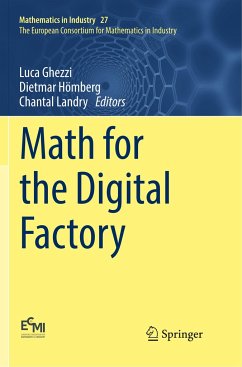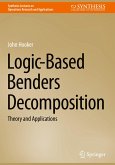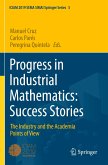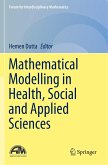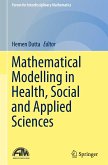This volume provides a unique collection of mathematical tools and industrial case studies in digital manufacturing. It addresses various topics, ranging from models of single production technologies, production lines, logistics and workflows to models and optimization strategies for energy consumption in production.
The digital factory represents a network of digital models and simulation and 3D visualization methods for the holistic planning, realization, control and ongoing improvement of all factory processes related to a specific product. In the past ten years, all industrialized countries have launched initiatives to realize this vision, sometimes also referred to as Industry 4.0 (in Europe) or Smart Manufacturing (in the United States). Its main goals are
- reconfigurable, adaptive and evolving factories capable of small-scale production
- high-performance production, combining flexibility, productivity, precision and zero defects
-energy and resource efficiency in manufacturing
None of these goals can be achieved without a thorough modeling of all aspects of manufacturing together with a multi-scale simulation and optimization of process chains; in other words, without mathematics.
To foster collaboration between mathematics and industry in this area the European Consortium for Mathematics in Industry (ECMI) founded a special interest group on Math for the Digital Factory (M4DiFa). This book compiles a selection of review papers from the M4DiFa kick-off meeting held at the Weierstrass Institute for Applied Analysis and Stochastics in Berlin, Germany, in May 2014. The workshop aimed at bringing together mathematicians working on modeling, simulation and optimization with researchers and practitioners from the manufacturing industry to develop a holistic mathematical view on digital manufacturing.
This book is of interest to practitioners from industry who want to learn about important mathematical concepts, as well as to scientists who want to find out about an exciting new area of application that is of vital importance for today's highly industrialized and high-wage countries.
The digital factory represents a network of digital models and simulation and 3D visualization methods for the holistic planning, realization, control and ongoing improvement of all factory processes related to a specific product. In the past ten years, all industrialized countries have launched initiatives to realize this vision, sometimes also referred to as Industry 4.0 (in Europe) or Smart Manufacturing (in the United States). Its main goals are
- reconfigurable, adaptive and evolving factories capable of small-scale production
- high-performance production, combining flexibility, productivity, precision and zero defects
-energy and resource efficiency in manufacturing
None of these goals can be achieved without a thorough modeling of all aspects of manufacturing together with a multi-scale simulation and optimization of process chains; in other words, without mathematics.
To foster collaboration between mathematics and industry in this area the European Consortium for Mathematics in Industry (ECMI) founded a special interest group on Math for the Digital Factory (M4DiFa). This book compiles a selection of review papers from the M4DiFa kick-off meeting held at the Weierstrass Institute for Applied Analysis and Stochastics in Berlin, Germany, in May 2014. The workshop aimed at bringing together mathematicians working on modeling, simulation and optimization with researchers and practitioners from the manufacturing industry to develop a holistic mathematical view on digital manufacturing.
This book is of interest to practitioners from industry who want to learn about important mathematical concepts, as well as to scientists who want to find out about an exciting new area of application that is of vital importance for today's highly industrialized and high-wage countries.

